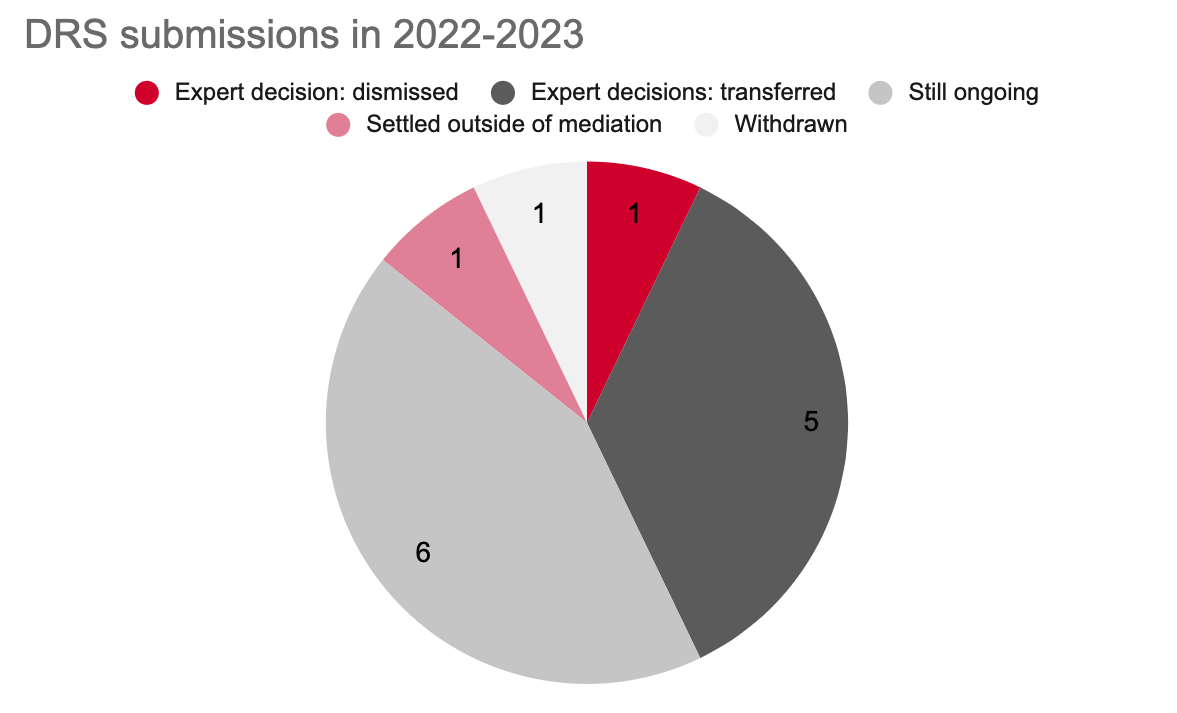Disputes resolution (2022-2023)
Online dispute resolution
In March 2022, following an extensive review of our dispute resolution service in 2019, we launched our Online Dispute Resolution (ODR) pilot, hosted by Immediation.
We see value in having an online portal for complainants, respondents, and mediators. Parties can view their matter in real-time, upload any documents, send a confidential message to their mediator and engage in the process at a time and place that works best for them. Settlement agreements reached at mediation are signed by both parties online. If mediation does not resolve the issue, parties can still proceed with the DRS process (complaint, response and reply), which can then be submitted to an expert for determination if requested.
We continue to provide free mediation via our ODR platform to assist people in resolving domain name disputes, providing an easy digital pathway to early resolution without the expense of expert determination or court.

Case study — dispute resolution mediation success
Following a recent family separation, a couple had an issue as to who should have rights to a domain name, which was critical to the continued operation of the couple’s business that was being taken over by one of the parties. Using the DNCL’s ODR platform, within weeks of raising their issue, a settlement agreement was signed and the domain name was transferred.
Dispute resolution — expert determination
Administered by the Commission, the dispute resolution service is an alternative to litigation. It can be used when someone wants to dispute a domain name registration, asserting that they have a better claim to it.
Number of expert decisions
Our experts issued seven decisions during the reporting year. (*Some decisions relate to matters filed in the previous reporting year.)
Expert decisions continue to be published by NZLII.
Fourteen submissions were received in the reporting year.

Image description
The pie chart shows the status of DRS submissions received in the 2022-2023 financial year:
- six expert decisions (one dismissed, five transferred),
- six are still ongoing,
- one has settled outside of mediation (where parties sorted it out themselves),
- one dispute was withdrawn as no fees were paid.
Expert determination case studies

Case: kiwibanks.co.nz (Result — transferred)
Complainant: Kiwibank Limited
Respondent: TY Lam
The complainant is a New Zealand bank established in 2002 with trademarks in the banking, insurance and finance industry. It operated predominantly under the domain name <kiwibank.co.nz> registered in 2001. The disputed domain name was registered in 2016 and resolved to a page where the domain name was offered for sale. The complainant contacted the email address linked to the registration, and a large figure was requested for transfer.
The expert found that the domain name was similar to trade marks held and was registered primarily for the purpose of sale for excess consideration, making it an unfair registration under the policy.

Case: ventair.co.nz (Result — transferred)
Complainant: Ventair Pty Ltd
Respondent: EvolutionFX
The complainant, Ventair Pty Ltd, is an Australian company that manufactures and distributes air movement products. An ex-employee set up and incorporated a rival business, EvolutionFX, and registered the disputed domain name.
The expert found that the history could be taken to mean the respondent knowingly used <Ventair.co.nz> to compete with the complainant, taking advantage of the complainant’s right to the name and, therefore, was an unfair registration.
Conflicted names resolution
Initially, our ODR pilot was intended for domain name disputes. We soon saw an opportunity to utilise the ODR platform to try and resolve conflicted domain names and take positive steps to achieve the .nz Advisory Panel’s 2020 recommendations 24-26 that outstanding conflicted domain names should be resolved.
A conflicted domain name is a .nz domain name that is available but is unable to be registered until it is resolved, for example: if anyname.co.nz and anyname.org.nz were registered to two different registrants (domain name holders) when registrations became available at the second level (registrations directly at .nz) then the domain name anyname.nz became a conflicted domain name. In order for a party to register anyname.nz, they would need to obtain the consent of the second registrant.
A final report on the outcomes of the conflicted names pilot programme is available on our website.